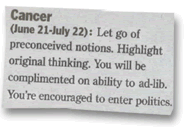06 Jul Conceptual Hobbies: My Primer
Once again the news is authenticating my life. The latest example comes from New Scientist magazine. It is reporting that studies now show that people become more eccentric as they age: “Odd and eccentric behaviour increases with age—but flamboyant behaviour becomes less pronounced, according to a new UK study.”
 Coincidentally, I’ve been thinking about my, um, specialness (ok, quirks) for the last month. This is what happens when an artist moonlights as a bureaucrat. To offset the effects of paper pushing, project managing, and heavy administrative duties most federal workers cultivate outside interests—hobbies: sports, stamp collecting, and primping one’s car, that sort of thing. This is especially important for an artist in my position. And after a long day in my cube, I’ve been encouraging myself to develop relaxing counterpoints. I started by inventorying my interests.
Coincidentally, I’ve been thinking about my, um, specialness (ok, quirks) for the last month. This is what happens when an artist moonlights as a bureaucrat. To offset the effects of paper pushing, project managing, and heavy administrative duties most federal workers cultivate outside interests—hobbies: sports, stamp collecting, and primping one’s car, that sort of thing. This is especially important for an artist in my position. And after a long day in my cube, I’ve been encouraging myself to develop relaxing counterpoints. I started by inventorying my interests.
Immediately I hit an obstacle. As an artist much of my free time (the little I have these days with full time job and full time family) is spent vying with my wife (who is also an artist) for time alone to do my work. My Work. This is how artists define our art endeavors. Serious stuff that can be fun and gratifying. Serious, fun, and gratifying? No wonder the general public thinks the word “artist” is an oxymoron? To some our activities are more akin to hobby material. Extra stuff.
When it comes to hobbies, I do, however, have some extra stuff. I continued compiling my extracurricular inventory.
Because my life is so packed, I’ve become good at organization. For an artist/bureaucrat/father with hobbies, proper time management is the key. So I have developed activities that are economical (nothing to buy or maintain), portable (require no space and are easy to accomplish almost anywhere—they are totally “non-object-oriented”), and inexpensive. These are conceptual hobbies. In no particular order, here they are:
First to clap. I like to be the very first to clap at the conclusion of a lecture, panel discussion, performance, or any other venue at which I am part of the audience. I’ve been doing this for about five years. It happened quite naturally actually. I simply took note of it one day when I was the first to put my hands together (artists often notice things others don’t).
After that, it became something I could collect (I’ve been the first to clap at over 120 events). I noticed how powerful I felt (perfect for our post-9/11 world) and it was so simple. Finally, it was something I could do on my own. I didn’t have to consult with anyone, get a critique, or rely on any fancy setup or organization. No highly effective collaboration techniques required. I could do this at will.
Starting Conversations in Elevators with Strangers. This is not something I can plan. It happens when the conditions are just right. And it takes a quick assessment of the other potential participants to determine if they might be open to bucking a strong, very human condition: looking towards the elevator door and staring at it in silence. It helps when the elevator has two sets of doors (often seen in DC’s subway), where you enter on one side and exit on the other. The group desire to face one direction is reduced. Individuals in this type of “pack” often face each other, further reducing the effect of this conditioning.
What you talk about under these conditions depends on the context of the elevator’s location. For example, the elevator at the end of my commute to work surfaces onto an area filled with various federal offices and Smithsonian museums. Early in the morning there aren’t many tourists so, it’s safe to assume we are mostly government workers. Conversations on this particular elevator are harder to start later in the day when the group is more variegated (and more exhausted after all that paper pushing).
Also, commuting with your children enhances the possibility a group discourse will ensue. My children, for example, love to press elevator buttons. And I’ve developed a fair system for making sure each gets her fill every day. We simply alternate (as my children have gotten older, they now allow me a place in this que). Last week, as we entered the lift, there was a small disagreement as to whose turn it was to press the button. It had been a particularly trying commute and everyone could tell my girls were antsy. As we entered, my eldest daughter decided that my bellybutton was considered an official button. Quickly sizing up the group, I stated “Yes, you press my buttons.” It got a nice laugh and everyone started discussing our children.
Incorporating TV advertising slogans in normal day-to-day conversations. I love advertising and the psychology behind it. Developing a previously unnecessary market for some new item facinates me. Home shopping networks are amazing. I love the way the “selling jockey” describes each product. How do they make these things sound so delicious and desireable? Listening to callers convey their pleasure at their latest purchase is equally wonderful to hear.
Before we got cable, I used to go over to my mother’s-in-law to watch QVC. She thought I was nuts and decided to alter my viewing habits (at least to get me out of her house) by buying us six months of cable for our next anniversary. To thank her, initially as a joke, I bought her one caret cubic zirconium earrings for her birthday. This is part of QVC’s Diamondique Collection (which is celebrating its 15th anniversary on the show, by the way). We were all surprised to see how big and and sparkling they were. My mother-in-law loved them (and for $34.95, they were a steal).
This is only background to my interest in speaking advertisese in my everyday life. A few years ago I could be found to inject the McDonald’s slogan “You deserve a break today…” quite often. After all, we did deserve a break as office workers and parents, so injecting it was not out of context. And that’s both the art and thrill of this hobby: incorporating these bits of Madison Avenue totally within the context of your conversation. It has to be seamless. The biggest thrill is when I can do this in a meeting without anyone even noticing. My eccentric hobbies involve some stealth. That’s part of the fun and excitement. See if you can inject these phrases at your next meeting: Can you hear me now? Good. (Verizon), Yeah, it’s kinda like that. (Sierra Mist), and We can’t make you work better, but we can make you better at work. (Allegra).
Amazingly, I seem to have passed this activity on to my eldest daughter. When she was about 17 months old, as we were driving around on suburban errands, my daughter would laugh as she proclaimed “There’s the Starbucks Logo!” How many parents can say that one of their daughter’s first words was logo?
Now that she’s older, she does equally well injecting lines from TV in her daily chat. Yes, we are a little concerned. But, as she gets older, we will just have to pay close attention to her sense of money, value, the marketplace, and need. Each child requires specific direction. And this is now on our list. Of course, I am secretly proud she is showing signs of idiosyncratic behavior. But it must be matched with wisdom and an understanding of the world. In due time.
Savings Bonds for Babies. Finally, one of my most gratifying hobbies. Eighteen years ago I was wondering how I could give back to the community I was born into. Trying to approach this creatively (after all, doesn’t eccentricity have a strong creative element behind it?) I decided every year, on my birthday, I wanted to give a savings bond to the baby born closest to the exact time of my birth at the hospital I was born in. As simple as this sounds (idiosyncratic behavior also incorporates an element of simplicity), it was not easy to carry off.
After finding the right department of the hospital, I had to convince them I was not off my rocker, that I was on the up-and-up (yes, this behavior can attract this personality trait too). It wasn’t much, a $50 savings bond with no strings attached. If the child’s parents wanted to get in touch with me that was fine. But I went out of my way to say this was as pure a gift as I could muster. No acknowledgement was necessary and, while I told them I hoped they would use it for the child’s needs, they could use it for whatever they wanted.
Once the hospital and I had established a relationship, we had to reassure the newborn’s parents that this was legit. A US Savings Bond requires a social security number. Many of these families were latino or from other immigrant groups. I could see where they might be a little leery.
For years I wanted to remain anonymous. I didn’t want any focus on me. One year, my hospital contact sent me an article that appeared in their hospital newsletter about an Anonymous Gift Giver. I must admit, I felt a little like the other Gates. Neat. But, again, I wanted no attention from this. In fact, this was a huge relief to me, given that, early on, I was trying to develop my career which did require some often exhausting attention getting.
A few years back, as my birthday approached, my wife and I talked about remaining anonymous. She made a good case for talking about it as it might encourage others to do the same. So, I slowly began to go public, telling a few friends at first and then some coworkers. I don’t know what it is, but it’s difficult to speak about this.
As a bonus for telling people, some tell me little quiet things they do to “pass it around.” Just last week, I mentioned this to someone in my office and she told me her father surreptitiously places $2 bills in arbitrary books in his public library. Amazing. Do any of you know of any other like-minded acts? My birthday’s coming up in the next couple of weeks. It’s time for me to get in touch with the hospital.
I’m hoping the UK study is true. I’m hoping that as I get older my eccentric tendencies will only increase. It helps me make sense of the world, such as it presently is.




Donna
Posted at 14:18h, 06 JulyRead an article about a guy who has a book project. You leave books around or sell them or donate them and write a log at the front, asking each reader to add to it. I forget the name of his project but it reminded me of the Gates projects in this entry.
Jeff
Posted at 10:36h, 07 JulyIn the world of coincidences, I just learned about BookCrossing this morning from a friend. Maybe this is what you were referring to.
Patrick
Posted at 23:10h, 17 JulyWell in an odd mix, I like to be the last one clapping at an event, whenever I start – I want to be the last one to fall silent.
I also like to strike up conversations with random people, usually just starting with a question and bypassing any greeting or some such formality.
I work at Universal Orlando and when I am out and about with guests I use “Howdy” as my number one greeting, which is rather eccentric because of the purpose. When people come to a new country, they expect a change in the culture, and “howdy” is about as American as you can get with a greeting.
Chesh
Posted at 01:49h, 18 JulyAs someone with a recurring case of RSI, I hereby declare that Jeff and Patrick are my surrogate clappers. Go to it, boys.
Jeff
Posted at 10:04h, 18 JulyPatrick, I think there may be a market for our services (if not, we will create one). We can hire ourselves out for special events.
Elections are coming up in November and we could insure that candidates get just the right amount of props. Of course, we will have a graduated pricing system. If the media are in attendance, proper applause duration (and might I add another feature: applause intensity) will be critical.
Oh, and let’s not forget the movie industry. We can make first weekend applause stats just as important as the ticket sales.
I see a big future for us in the applause metering industry.
Patrick
Posted at 00:13h, 19 JulyJust think it, 25 cents a clap, two clappers, 100 claps each…. thats a decent amount of money for a few minutes of work.
Donna
Posted at 00:30h, 23 JulyAbout like-minded acts – read in the LA Times today (7/22/02), front page, that an anonymous donor gave 50 envelopes each with a $50 bill. Members of the congregation were to take one and use the money for good. Some donated to charity but others gave it to take 9 disabled children to play golf, or buy a cancer patient a ham (don’t think I would have picked ham) – a tired mother was given a massage.
OH! I read the article and there’s a Barbara GATES who has the Random Acts of Kindess Foundation!! If you go to the LA Times website, you can read this article.
Dave
Posted at 13:21h, 26 JulyI live in a city with a lot of parking meters.
When I see a cop starting to ticket a long line
of cars with expired meters, I walk to each
expired meter and put a quarter in until I’m out
of quarters.
I love twarting the cop’s ticket-writing and
anonymously helping fellow drivers.
Jeff
Posted at 13:27h, 26 JulyDave, do the police ever give you a look? Have they made any comments to you?
Dave
Posted at 14:41h, 26 JulyOnly once was I spotted (usually the cop is bent
over a pad writing the ticket) and he was annoyed,
but I just kept walking. I go out of my way to
do it discreetly.